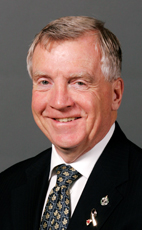Mr. Speaker, Canada is in Afghanistan as part of a UN-mandated mission, at the request of the democratically elected Afghan government and in company with our NATO and other allies.
We are playing a leadership role in Afghanistan and Canadian engagement is wide-ranging because we know that development and security go hand in hand. Without security, there can be no humanitarian assistance, no reconstruction and no democratic development.
We have deployed diplomats, development workers, troops and civilian police to help the Afghan government secure a better future for its people. We are training Afghan soldiers and police. We are mentoring public officials and helping the Afghans implement key national strategies. Canada is contributing to efforts to strengthen the rule of law in Afghanistan, including the appropriate treatment of prisoners, through support for comprehensive justice and security sector reform.
I can assure my colleague that Canadian officials are also in regular dialogue with Afghan officials at the most senior level in regard to this matter. That being said, the decision to transfer prisoners remains an operational matter and is the responsibility of the Canadian Forces, taking into account Canada's obligation under international law.
In assessing whether these obligations can be met, the Canadian Forces taken into information from a variety of sources, including other government departments. It is important to highlight that the Canadian Forces in Afghanistan are fully trained and have clear and detailed instructions on all matters relating to prisoners, including the factors for determining their release or transfer.
As we all know, the military does not release information on how the Canadian Forces process prisoners. Such information could be used against the Canadian Forces by an enemy able to adapt its practices and instruct its fighters on how to better execute operations against Canadian soldiers, Afghan security forces and our allies.
The Government of Canada has an arrangement in place with the government of Afghanistan regarding the transfer of prisoners. This arrangement allows full access to Canadian officials to monitor the condition of prisoners turned over by the Canadian Forces.
As a result, we discovered one credible allegation last fall. The Canadian Forces responded quickly and in a manner consistent with Canada's obligations under international law upon learning of that credible allegation.
Since that time, actions taken by the government of Afghanistan and Canadian officials in Kandahar to address the commander's concerns have been carefully considered and the Canadian Forces are satisfied that based on the facts, transfers can resume. The decision to resume transfers reflects the commander's restored confidence that transfers can be made in accordance with our obligations under international law.
The Canadian Forces exercise discretion every time it transfers a prisoner. Clearly the transfer will not be authorized if the commander assesses that there are substantial grounds to believe there is a real risk that a prisoner would be tortured or mistreated if transferred. The transfer of prisoners remains an operational issue. Any future announcements will be made at the discretion of the Canadian Forces, in light of operational security considerations at the time.
As the government has signalled in the motion currently before the House, we are committed to greater openness. That being said, the Canadian Forces must always balance its commitment to transparency against the need to safeguard operational information and the security personnel.
Canada takes its legal obligations very seriously and I can assure members that the Canadian Forces treat all prisoners humanely. As a matter of policy, prisoners are treated in accordance with the standards of protection afforded to prisoners of war under the Geneva Conventions. Canada has been and continues to be in regular dialogue with our NATO and ISAF allies on all aspects of ISAF's mission, including the treatment of prisoners transferred by allied forces.
Canadian officials have consistently underscored the need for Afghan authorities to treat prisoners humanely and in accordance with Afghan's international obligations. We will continue to work closely with the government of Afghanistan and the Human Rights Commission to ensure that treatment is proper.

